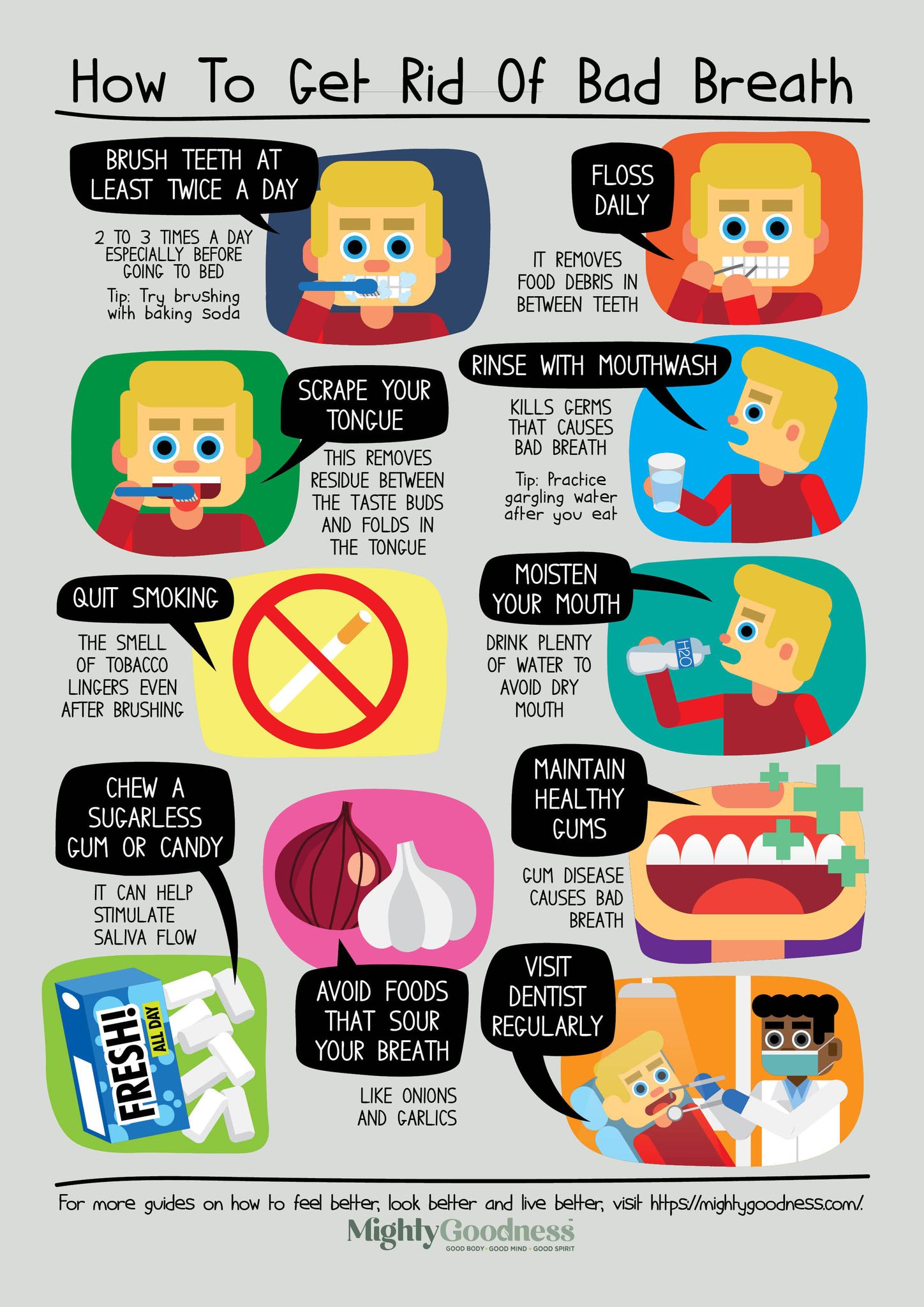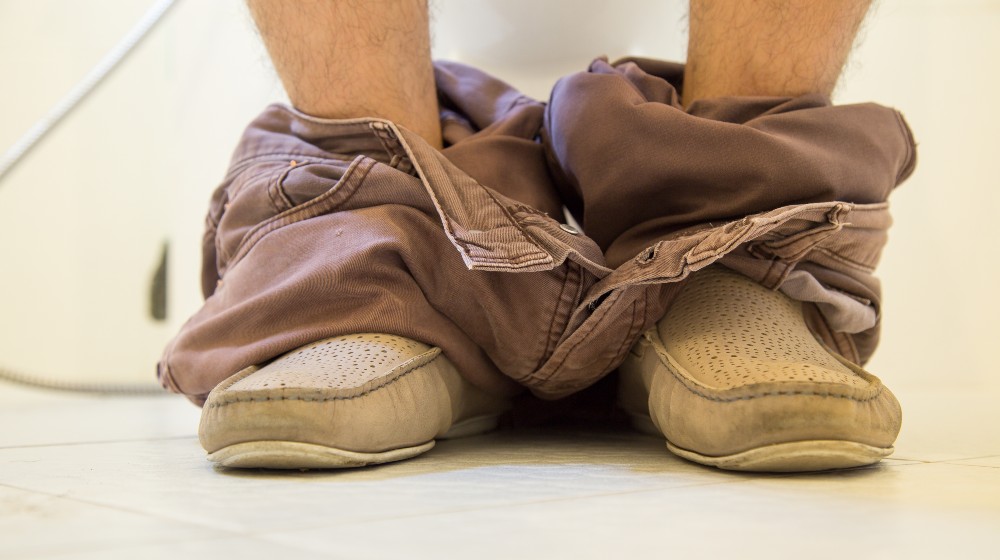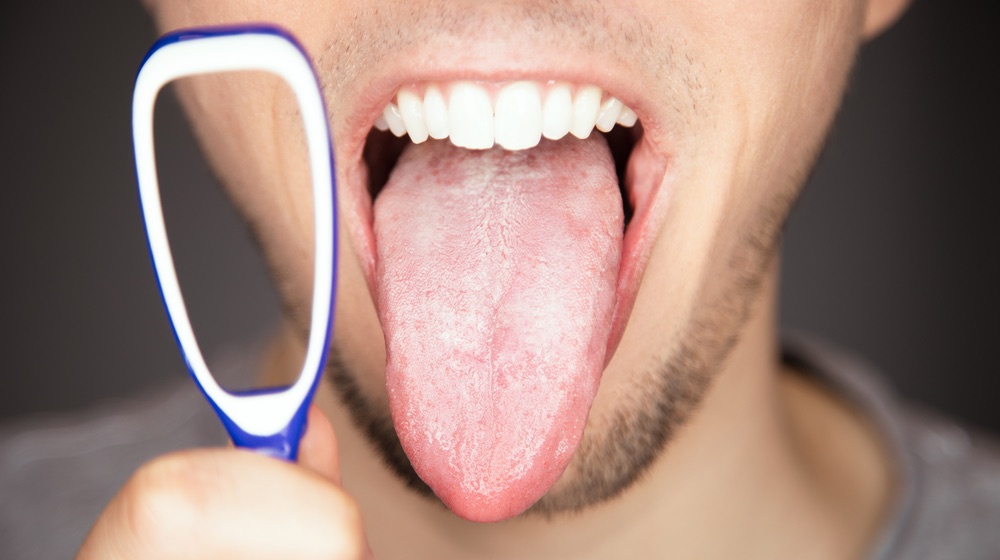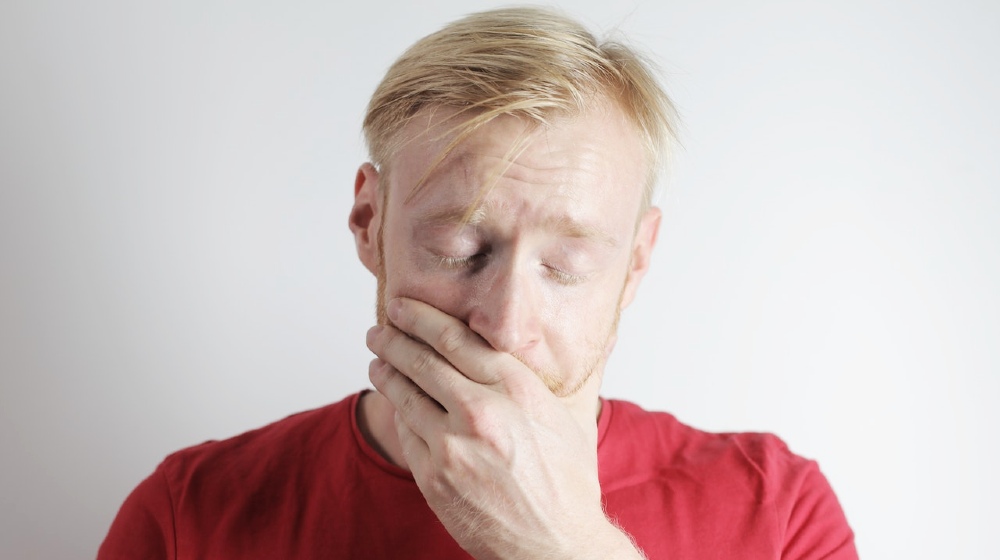Worried about how to get rid of bad breath? While it may not be a serious condition, it may trample your self-esteem and confidence.
Fortunately, with simple causes come equally simple solutions. And most of them are quick and simple changes yet super effective.
Continue scrolling to find out what to do if you have bad breath.
In this article:
- How Do I Get Rid of Bad Breath?
- What Are the Symptoms of Bad Breath?
- What Causes Bad Breath?
- What Foods Should I Avoid?
- Who Do I Consult With to Get Rid of Bad Breath?
- The Crux of Bad Breath
RELATED: An Easy & Effective Guide To Breaking Bad Habits
What You Need to Know About Bad Breath
Click here to jump to the instructographic.
How Do I Get Rid of Bad Breath?

There are a number of things you can do to get rid of bad breath, all of which involve lifestyle changes or adopting new habits.
- Practice proper dental health. Brush your teeth for two minutes twice a day or after meals. Rotting food debris and the bacteria it takes to break these down can create a bad odor in your mouth. Cavity-causing plaque that builds up and coats your teeth may also create a stench.
- Use mouthwash. Alongside brushing your teeth and flossing, swishing around mouthwash may also safeguard against plaque and gingivitis. However the effect may not be long-lasting, so it can only work when combined with other healthy habits.
- Brush your tongue regularly. Also brush your tongue when you brush your teeth, especially when you notice a white coat over your tongue. The objective of brushing your teeth is to clean all surfaces, from your gums, teeth, and tongue.
- Floss daily. Flossing daily may help get rid of decaying food debris and prevent the formation of plaque.
- Rinse your mouth after eating. Getting rid of food debris early on may help prevent bad breath. If you don't have mouthwash, you can swish water around your mouth in the meantime. This is even more incentive to drink water everyday.
- Keep your dental appliances clean. It may not just be your mouth, but your dental appliances that cause a strong odor. If you wear removable braces or retainers, clean them as your dentist instructed. Remove your dentures before bed and soak them in a disinfecting solution.
- Prevent dry mouth. A dry mouth could also lead to a bad odor as saliva helps plaque at bay and gets rid of dead cells. If your mouth is feeling dry, chew on some sugar-free gum or drink water.
- Stop smoking. Cigarette smoke emits a bad odor that could linger, and the habit itself may cause a dry mouth.
- See your dentist twice a year. Visit your dentist twice yearly for general cleaning.
RELATED: 10 Best Diets For Men (and How to Choose One)
What Are the Symptoms of Bad Breath?

There are ways you can catch bad breath before anyone else can.
Watch out for the symptoms below. If you can relate to these, you may have halitosis or bad breath:
- a white layer on the surface of your tongue especially at the back
- dry mouth
- plaque build up on your teeth
- morning breath, burning tongue
- thick saliva
- bitter, sour, or metallic taste on your tongue
You may also lick your wrist, allow it to dry, and then smell it. If there's a bad odor, you may have bad breath.
What Causes Bad Breath?

Bad breath, which may also be called halitosis, is usually caused by rotten food, bacteria, or certain foods or drinks.
Food debris may attach to your teeth and around your gums. If you don't practice proper dental hygiene, it will rot in your mouth and lead to bad breath.
It may also cause the growth of bacteria, which may lead to gingivitis. Gingivitis may also cause bad breath.
More than just considering the food left between your teeth, you may also want to look into your diet.
What Foods Should I Avoid?

There are foods that when absorbed into the bloodstream, emit a bad smell. The smell could stay for up to 72 hours or until they fully leave your body.
Some foods may indirectly cause bad breath by leaving you with a dry mouth. Even your doctor-prescribed medication may give you dry mouth, also leaving you with bad breath.
If you're expecting an important meeting, you may want to steer clear of the foods below:
- onions
- garlic
- fish
- dairy
- coffee
- alcohol
- sugary food
- spicy food
- pastrami
- horseradish
- excessive meat
Bad breath from food is temporary and can be masked by frequently brushing your teeth, swishing mouthwash, or chewing on sugar-free gum.
If even after making lifestyle and dietary changes your bad breath persists, you may have to consult a healthcare professional.
Who Do I Consult With to Get Rid of Bad Breath?

Visit your dentist if you're having difficulty getting rid of bad breath.
Here are some reminders to prepare you for your visit:
- Make an appointment for the morning before any meals.
- Don't spray on perfume or cologne that could mask your bad breath.
- Your dentist may discuss with you your current dental routine and some health conditions you may have.
- If you take any medication, you may want to show this to your dentist as medication might also cause dry mouth, and therefore bad breath.
Your dentist may be able to identify your halitosis just by smelling your breath or by smelling the scrapings from the back of your tongue. Some dentists may ask you to breathe into a paper bag, which he or she will then smell. Your dentist will then rate the smell on a 5-point, or 10-point scale.
In cases like these, the patient needs to avoid foods with strong odors 48 hours prior to the visit.
There are other more sophisticated or advanced methods for a dentist to diagnose halitosis. They measure compounds and substances that may cause bad breath. These tests include:
- Gas chromatography
- Sulfide monitoring
- Chemical sensors
- BANA test
- Measuring ß-galactosidase activity
- Salivary incubation test
- Ammonia monitoring
- Ninhydrin method
Gum disease may also cause bad breath. In which case your dentist could refer you to a periodontist.
In some cases, bad breath could be a symptom of a much larger problem such as:
- Periodontal diseases
- Ketoacidosis (let your doctor know if you've tried a new diet)
- Aspiration pneumonia
- Sinus infection
- Chronic bronchitis
- Brochiectasis
- Diabetes
- Liver or kidney disease
- GERD
- Bowel obstruction
The Crux of Bad Breath
Adopt habits that keep your mouth moist, healthy, and bacteria-free. Avoid habits and foods that create a foul odor to prevent bad breath from recurring. When these don't work, approach your dentist or periodontist for professional help. If halitosis is caused by other underlying conditions, a healthcare professional will be the best judge.
The crux of getting rid of bad breath is to decrease the bacteria load.
Here’s an instructographic guide. Don’t forget to download, save, or share this handy instructographic for reference:

There are habits – or lack thereof – that we may not know actually cause halitosis or bad breath. Thankfully, simple lifestyle changes and new habits may both get rid of and prevent bad breath.
You'll find everything you need to know about bad breath in this video:
Do these tips help bring back your confidence? Let us know in the comments section below.
Up Next:
- Starting Over at 50: How To Deal With 10 Major Changes In Men
- 13 Best Tips on Aging Gracefully
- What’s the Deal With Penis Shrinkage? What You Need To Know About Penile Atrophy
Calling all crafting Health Buffs! If you’ve got the gift of keeping healthy and sharing this knowledge through writing. Click here if you want to write for us.
Please stay connected with us on Facebook, Twitter, Instagram, and Pinterest, and make sure to join our community of healthy living and minded people here.
Trending
Best Multivitamin for Men | Top 10 Best Multivitamins for Men 2022
Tongue Color | 7 Scary Tongue Color Meanings
Get Updates
SIGN UP FOR OUR NEWSLETTER TODAY


Tongue Color | 7 Scary Tongue Color Meanings

